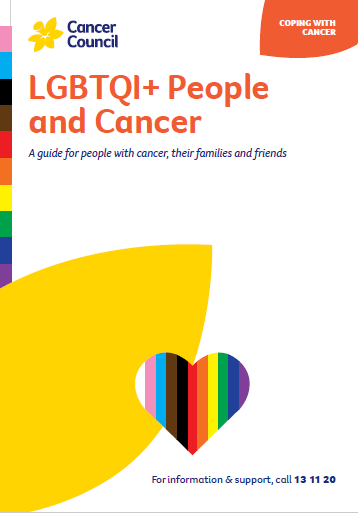- Home
- About Cancer
- LGBTQI+ People and Cancer
- Coping with cancer
- How to come out to your health professionals
How to come out to your health professionals
You deserve to be treated with respect by all the health professionals who look after you. If you find the thought of disclosing your sexual orientation, gender or intersex variation stressful, some of the following tips and suggestions may be helpful to you.
Decide beforehandBefore your appointment, think about how much information you want to share and who you want to share it with. Prepare some notes so you don’t forget anything. | |
PractiseYou may feel more confident talking to your health professional if you practise what you want to say with your partner/s, family and friends. | |
Have someone with youConsider having a support person, such as a partner, family member or close friend, with you to help with the discussion and to provide support. They can also help you debrief and provide assistance with making a complaint if you receive a negative reaction. If you don’t feel safe, you can choose to leave the room. | |
Do it in writingIf you’re not a confident speaker, write down what you want to say to your health professionals. You can also ask your GP to include information about you in their referral letter to other specialists, such as your sexual orientation, intersex variation, pronouns or preferred name. | |
Ask for privacyIf you’re in a ward or open area, ask to speak in a quiet, private place where you won’t be overheard. | |
Communicate your pronounsConsider including your pronouns when you introduce yourself. You could say “My name is Parker Jones and I use they/them pronouns”. If you are misgendered, you could provide a simple correction such as “Oh, I use they/them pronouns, thanks.” Wearing a pronoun badge is another way to remind people of your pronouns. | |
Introduce your partner/sIf you have a partner or partners, encourage them to come to your appointments. This lets your doctor know who’s important to you. Before your first appointment, it’s okay to phone or email your doctor to find out if they are LGBTQI+ friendly. You could say, “My wife will attend the appointment with me, we are both women, just so you know.” | |
Communication aidsYou can use the Genders, Bodies and Relationships Passport to make telling your health professionals about your gender, body and relationships easier. Visit LGBTIQ+ Health Australia to order a copy. | |
Seek supportContact QLife, a national peer support and referral service for LGBTI people. Call 1800 184 527. |
→ READ MORE: Dealing with discrimination
Podcast: Coping with a Cancer Diagnosis
Listen to more of our podcast for people affected by cancer
We thank the chief investigators from the Out with Cancer research project: Prof Jane Ussher, Prof Janette Perz, Prof Martha Hickey, Prof Suzanne Chambers, Prof Gary Dowsett, Prof Ian Davis, Prof Katherine Boydell, Prof Kerry Robinson and Dr Chloe Parton. Partner investigators were Dr Fiona McDonald and A/Prof Antoinette Anazodo. Research Associates were Dr Rosalie Power, Dr Kimberley Allison and Dr Alexandra J. Hawkey.
We thank the reviewers of our LGBTQI+ People and Cancer booklet: Prof Jane Ussher, Chair, Women’s Heath Psychology and Chief Investigator, Out with Cancer study, Western Sydney University, NSW; ACON; Dr Kimberley Allison, Out with Cancer study, Western Sydney University, NSW; Dr Katherine Allsopp, Supportive and Palliative Care Specialist, Westmead Hospital, NSW; A/Prof Antoinette Anazodo OAM, Paediatric and Adolescent Oncologist, Sydney Children’s Hospital, NSW; Megan Bathgate, Consumer; Gregory Bock, Clinical Nurse Consultant–Oncology Coordinator, Urology Cancer Nurse Coordination Service, WA Cancer & Palliative Care Network, WA; Morgan Carpenter, Executive Director, Intersex Human Rights Australia (formerly OII Australia); Prof Lorraine Chantrill, Medical Co-Director Cancer Services, Illawarra Shoalhaven Local Health District, NSW; A/Prof Ada Cheung, Endocrinologist, Head, Trans Health Research Group, Department of Medicine (Austin Health), The University of Melbourne, VIC; Bonney Corbin, Australian Women’s Health Network; Cristyn Davies, Research Fellow, Specialty of Child and Adolescent Health, Faculty of Medicine and Health, The University of Sydney and Children’s Hospital Westmead Clinical School, NSW; Prof Ian Davis, Professor of Medicine, Monash University and Eastern Health, Medical Oncologist, Eastern Health, Chair, ANZUP Cancer Trials Group, VIC; Rebecca Dominguez, President, Bisexual Alliance Victoria; Liz Duck-Chong, Projects Coordinator, TransHub and Trans Health Equity, ACON, NSW; Lauren Giordano, 13 11 20 Consultant, Cancer Council NSW; Hall & Wilcox (law firm); Natalie Halse, BCNA Consumer Representative; Jem Hensley, Consumer; Prof Martha Hickey, Professor of Obstetrics and Gynaecology, The University of Melbourne, and Director of the Gynaecology Research Centre, The Women’s Hospital, VIC; Kim Hobbs, Clinical Specialist Social Worker – Gynaecological Cancer, Westmead Hospital, NSW; Dr Laura Kirsten, Principal Clinical Psychologist, Nepean Cancer Care Centre, NSW; Amber Loomis, Policy and Research Coordinator, LGBTIQ+ Health Australia; Julie McCrossin and Melissa Gibson, Consumers; Dr Fiona McDonald, Research Manager, Canteen, NSW; Dr Gary Morrison, Shine a Light (LGBTQIA+ Cancer Support Group); Penelope Murphy, Cancer Council NSW Liaison, Prince of Wales Hospital, NSW; Dr Rosalie Power, Out with Cancer study, Western Sydney University, NSW; Jan Priaulx, 13 11 20 Consultant, Cancer Council NSW; Paul Scott-Williams, Consumer; Simone Sheridan, Sexual Health Nurse Consultant, Sexual Health Services, Austin Health, VIC; Cheryl Waller and Rhonda Beach, Consumers.
View the Cancer Council NSW editorial policy.
View all publications or call 13 11 20 for free printed copies.
Need to talk?
Support services
Coping with cancer?
Speak to a health professional or to someone who has been there, or find a support group or forum
Need legal and financial assistance?
Pro bono services, financial and legal assistance, and no interest loans
Cancer information
Dealing with the diagnosis
Common reactions to a cancer diagnosis and how to find hope
Explore our resource hub
Explore and download our booklets, fact sheets, podcasts, webinars and videos for people affected by cancer
